The financial services sector runs on strong client relationships and accurate data. Whether you’re an MCA or an insurance broker, managing client data and keeping track of every interaction can be a challenge.
Finance CRM tools are now full platforms that help funders and brokers keep things simple, handle client relationships, and raise customer satisfaction.
In this article, we will look at the top 5 CRM tools for financial services in 2026 and explain why each one can be a suitable choice for brokers, funders, and insurers.
What is CRM for Financial Services?
Customer relationship management (CRM) in the financial services sector is a system that helps funders, insurers, and other financial service providers manage client data, strengthen client services, and organize communication.
A financial services CRM combines customer information, contact management, and financial data in one place.
With cloud-based CRM platforms, teams can streamline operations, automate repetitive tasks, and provide personalized communication while keeping financial data safe through secure data storage.
These platforms can also offer marketing automation capabilities and financial tools, helping providers manage client services and compliance in one place.
Ready to speed up funding decisions? Book your demo today and see Heron in action.
5 CRM Platforms You Can Try Out Today
The right CRM platform can help you track leads, follow up faster, and keep funding deals moving.
To give you a head start, here are five CRM platforms you can try out today that are well-suited for managing clients, applications, and deals in this industry.
1. Zoho CRM for Finance
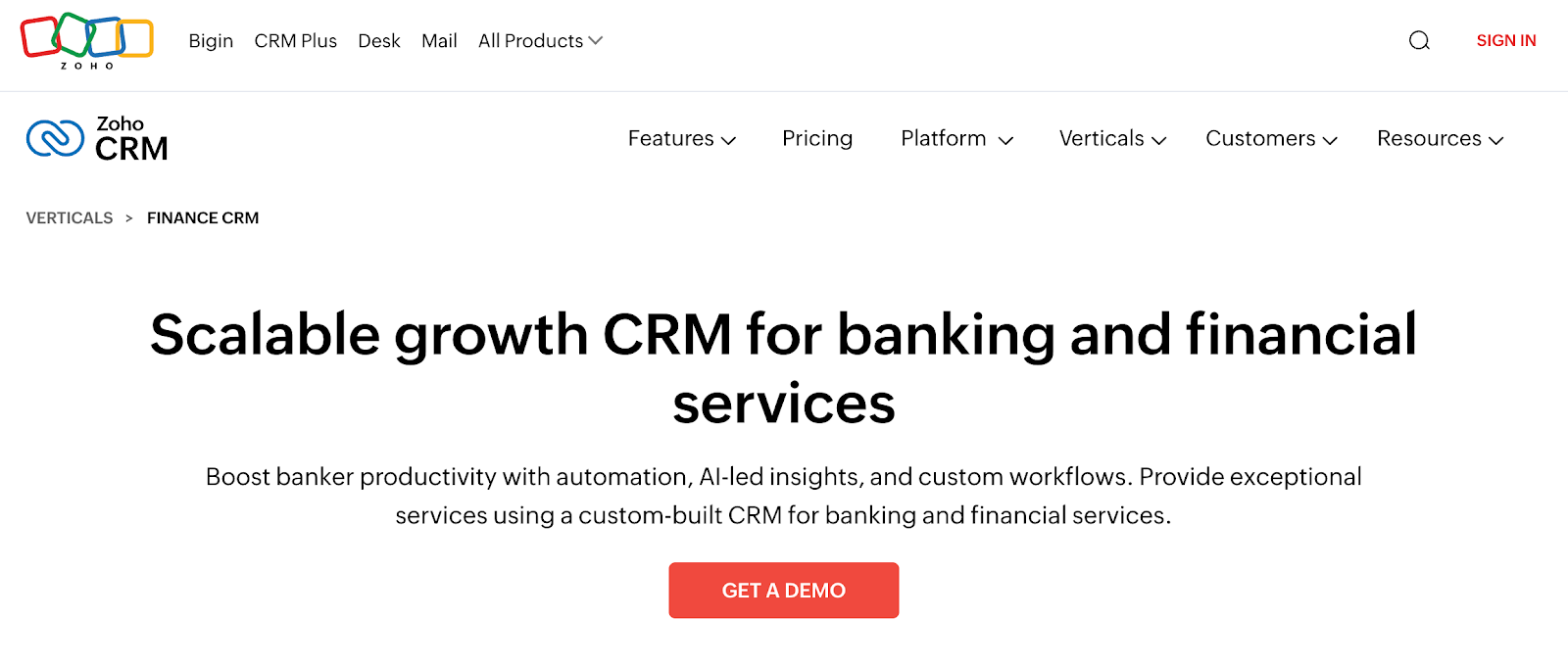
Zoho CRM for Finance is a platform for banks, funders, and finance teams to manage client interactions in one place.
It combines customer data, loan applications, and compliance tools so teams can work with clarity.
Zoho CRM also connects with credit bureaus and banks to quickly verify details like credit scores and business registrations
Key Features
- Customer data management - Collect and view personal and financial details from different sources in one dashboard to manage client interactions with more context
- Automated onboarding and KYC - Speed up client onboarding by verifying documents, biometrics, and e-signatures directly against official records
- Loan origination workflows - Move loan applications from submission to approval and disbursal using automated steps and in-app collaboration
- Compliance support - Secure client information, generate reports, and follow regulatory standards such as GDPR, CCPA, and fair lending rules
- Dashboards and insights - Track sales, lending performance, and customer activity through visual dashboards that highlight trends and areas for growth
2. Salesforce Financial Services Cloud
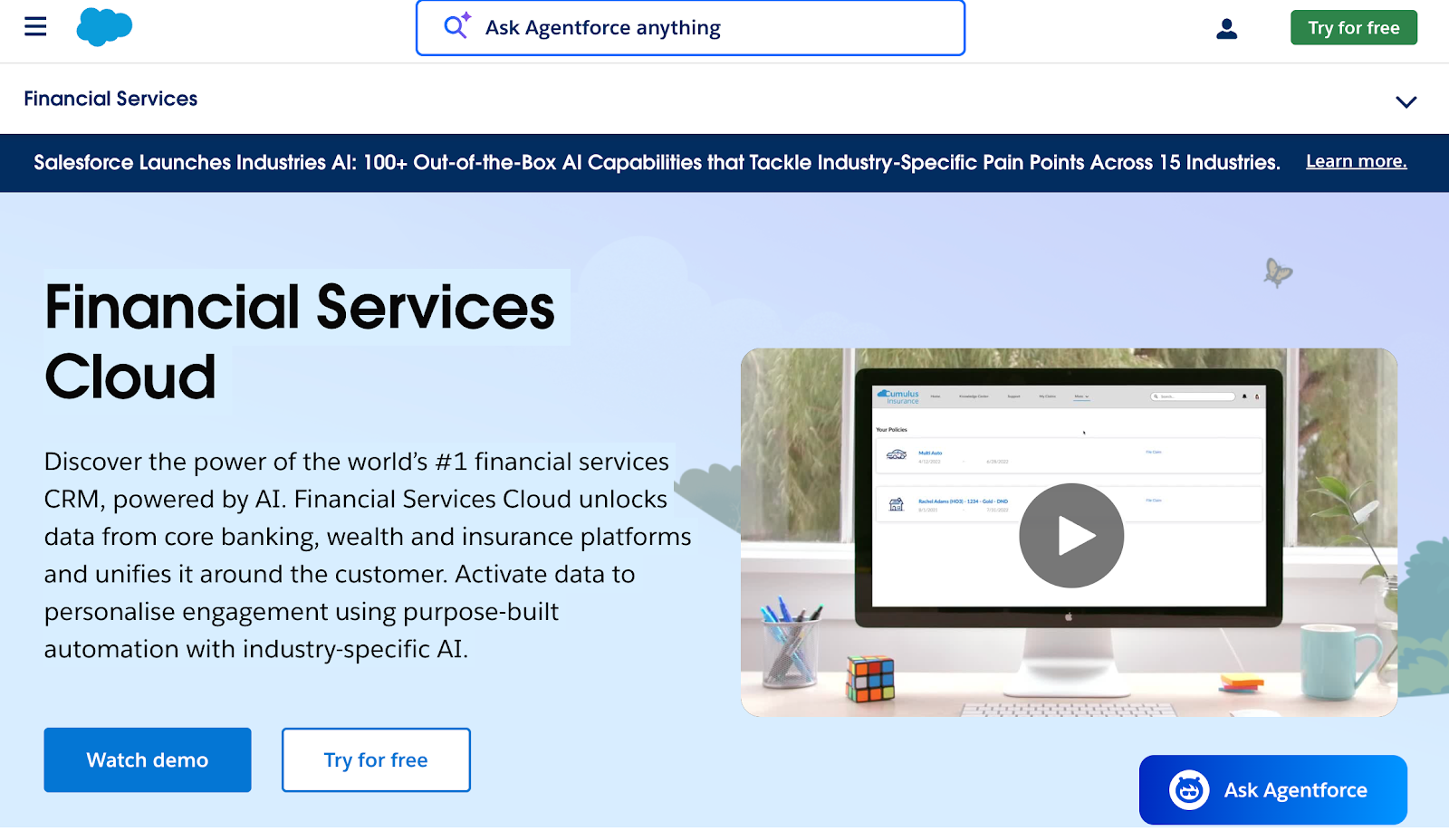
Salesforce Financial Services Cloud is a financial services CRM platform that helps professionals manage client management tasks and sales processes in one system.
It connects data from banking, wealth, and insurance platforms to give a complete view of each client.
This makes it easier for funders to track relationships, manage loan or funding applications, and keep client details in one place. AI-driven insights highlight opportunities for growth and make sales processes more efficient.
Key Features
- Unified client profiles - Brokers can view personal, financial, and relationship details in one dashboard to manage client interactions more easily
- Actionable relationship center - Track household members, business contacts, and related entities to help spot new sales opportunities and plan targeted actions
- Onboarding console - Speed up onboarding with templates, disclosure management, and automated checks that reduce delays
- Self-service portal - Give clients digital access to update information, submit requests, or track funding and insurance applications without waiting for direct support
- Financial data platform - Bring together data from different financial systems so funders and brokers can create better financial plans, track goals, and personalize engagement
3. Cloudsquare
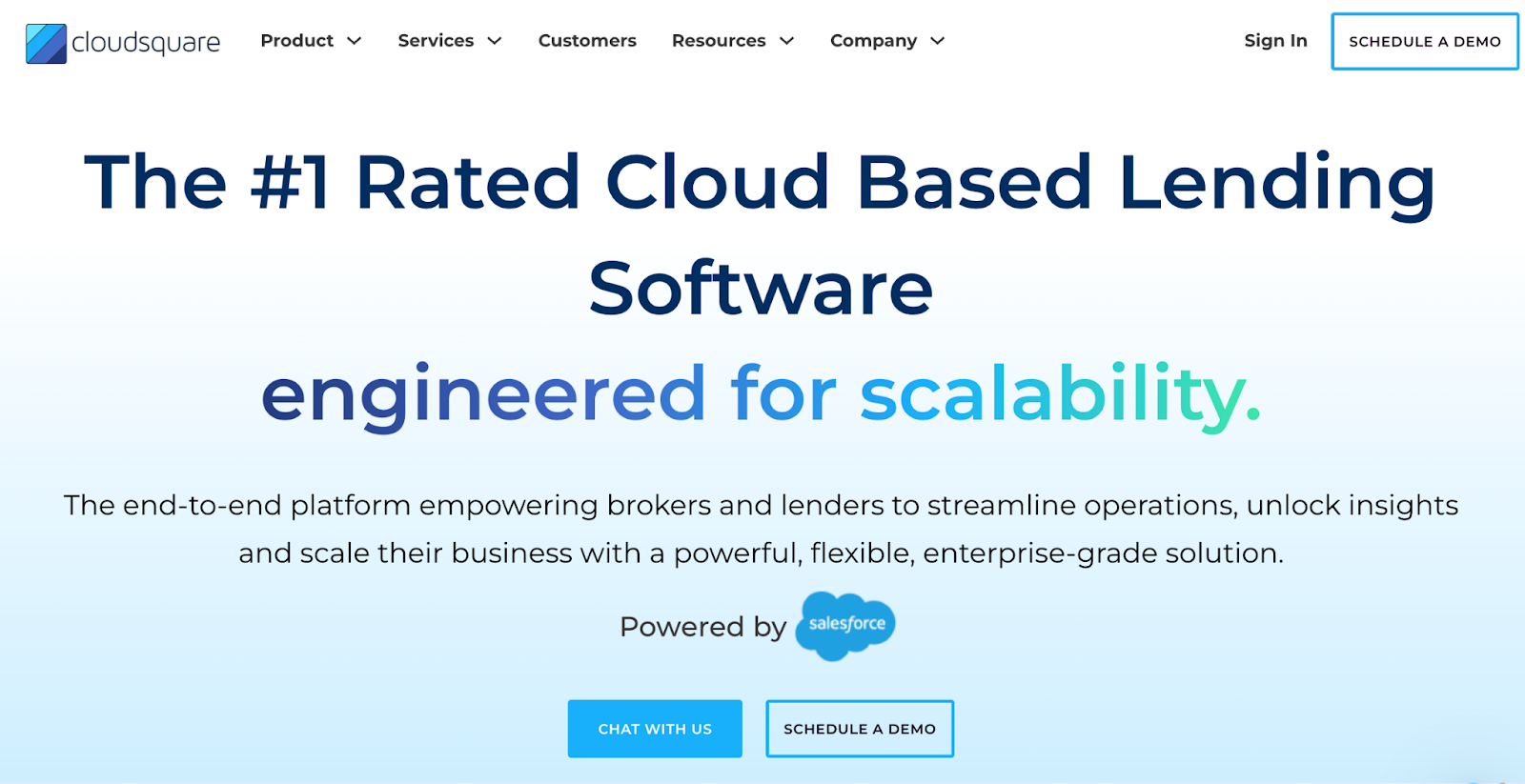
Cloudsquare Broker is a merchant cash advance software and CRM built for brokers in the financial services industry.
It helps manage the entire MCA process from lead generation to funding and renewals within Salesforce.
The platform combines CRM tools with automation, funder integrations, and renewal management to help brokers organize data, track deals, and close funding faster.
Key Features
- End-to-end process management - Manages the full MCA cycle from lead to renewal in one centralized system
- Intelligent submissions - Suggests the best matching funders based on criteria and past relationships to speed up approvals
- Online applications with eSign - Automatically creates and assigns leads from signed forms using predefined rules
- API integrations - Connects with major funders to enable faster submissions and real-time updates
- Renewal management - Automates renewal tracking and forecasting to maintain steady revenue and repeat funding opportunities
4. HubSpot for Financial Services
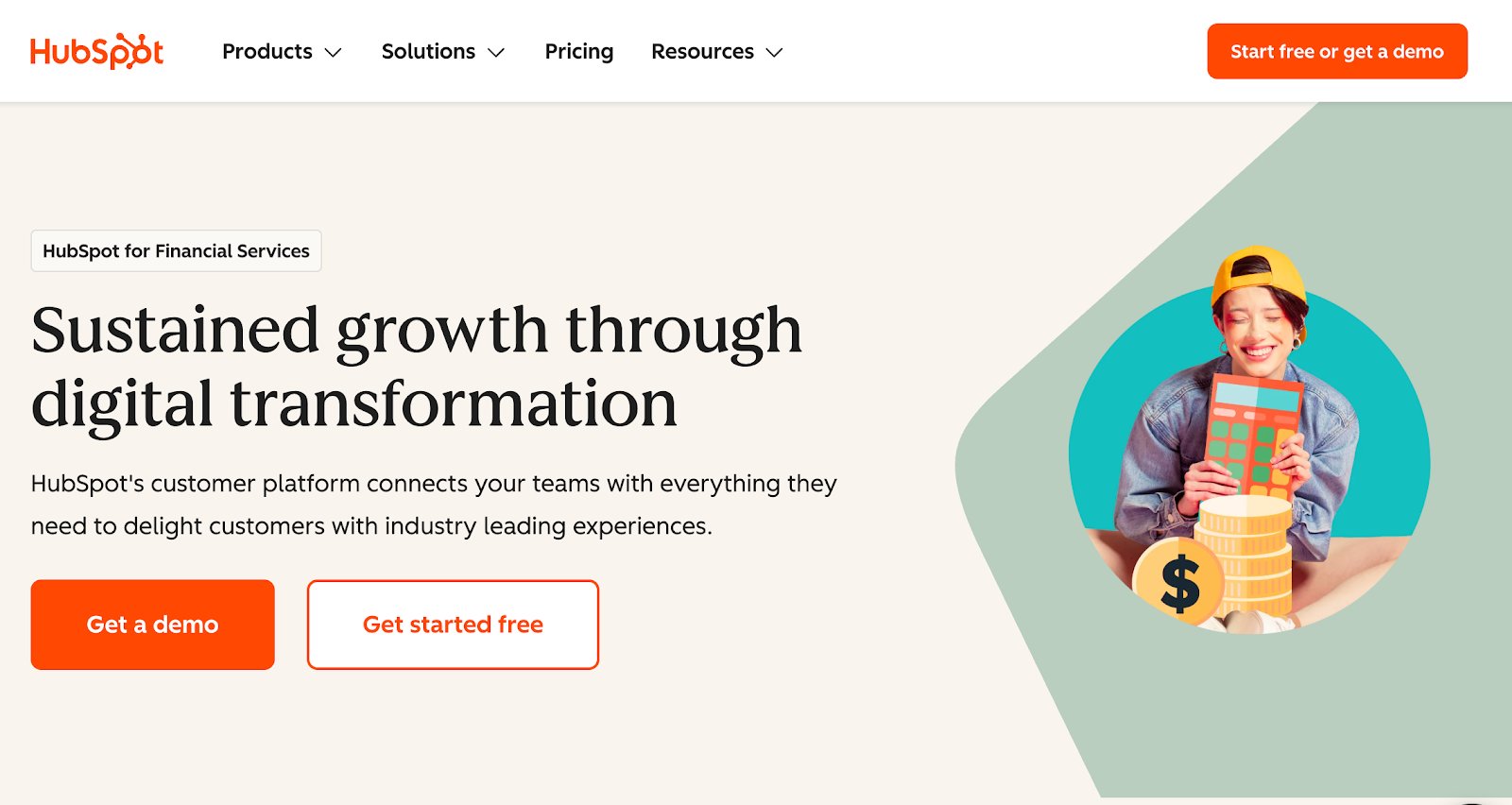
HubSpot for Financial Services is a client relationship management platform that helps funders and brokers adapt to changing customer expectations.
It brings sales, marketing, and service tools into one system, making it easier to enhance client engagement while staying on top of regulations and digital transformation.
Insurance brokers can manage policies, automate renewals, and create self-service options to give clients more control over their customer interactions.
Key Features
- Personalized client journeys - Use marketing tools to segment by financial goals and automate communication, improving client engagement at scale
- Centralized relationship dashboard - View all client data in one place so you can have more personalized conversations without switching tools
- Automated follow-ups - Streamline account opening and funding steps by setting automated reminders and next steps to keep clients moving through the process
- Service and support tools - Track client searches, send surveys, and identify content gaps to improve customer interactions and provide better support
- Insurance-focused workflows - Automate policy renewal campaigns, track quotes to binding, and build searchable repositories of coverage information for brokers
5. LendSaaS

LendSaaS is an MCA CRM platform designed to automate and simplify every stage of the funding process.
It manages underwriting, application scanning, and collections within one system. The platform also allows brokers to customize workflows, automate bank parsing, and send offers directly to ISOs.
Built for efficiency, LendSaaS helps users process high volumes of data and transactions securely while maintaining flexibility in underwriting and payment operations.
Key Features
- Automated bank parsing - Processes and analyzes bank statements in seconds using integrated APIs like Moneythumb and DataMerch
- Customizable underwriting rules - Allows users to set their own decision parameters for faster and more accurate underwriting
- Offer customization - Lets brokers create or adjust borrower offers manually or use pre-set pricing options
- ACH collections management - Supports customizable ACH collection settings, including frequency, processor, and same-day ACH options
- Email offer links - Enables direct sending of offer links to ISOs for a complete end-to-end MCA management process
Benefits of CRM Software for Brokers and Funders
Brokers and funders deal with large amounts of customer data every day. They handle loan requests, insurance policies, and client relationships that require accuracy and trust.
CRM solutions give financial professionals the tools to manage customer data in one system while keeping track of every interaction.
See the Full Picture of Every Client
CRM solutions give funders a complete view of client information, including contact details, transaction records, and communication history.
This makes it easier to understand client behavior, identify financial planning needs, and personalize services.
For example, an MCA broker can quickly see if a client may need refinancing, while an insurance broker can track policy renewal opportunities.
Having all data in one place improves customer satisfaction and allows firms to respond more accurately.
Keep Leads and Deals Moving
Strong lead management is one of the most valuable benefits of a finance CRM. By recording every interaction and follow-up, brokers and funders can prevent missed opportunities.
CRM tools also automate repetitive tasks like reminders, lead nurturing emails, or scheduling calls. This frees time for financial professionals to focus on building relationships and closing deals.
An SMB funder, for instance, can automate follow-up emails for loan applicants while their sales team concentrates on new funding requests.
Make Operations Smoother With Automation
A finance CRM improves operational efficiency by automating routine processes. This can include onboarding new clients, tracking compliance steps, processing loan documents, or managing insurance claims.
Instead of relying on spreadsheets or separate accounting software, CRM solutions centralize the work, reduce errors, and make audits easier.
Financial services firms save time and improve accuracy, which translates into smoother client services and better internal workflows.
Improve Teamwork and Communication
CRM tools allow teams to share client information in real time, so everyone has access to the same customer data.
For example, a broker can record a client’s communication history, and the service team can view it instantly to continue the conversation without asking the same questions.
This level of collaboration not only saves time but also helps improve customer service by creating a consistent experience.
Use Data to Make Smarter Decisions
Modern finance CRM systems include analytics that reveal trends in client behavior and business performance. Brokers can review reports on conversion rates, loan applications, or policy renewals to adjust their strategies.
These insights help financial services firms improve product offerings, target the right client segments, and plan future growth.
For instance, if a report shows that most clients request funding during certain months, marketing automation campaigns can be timed to match demand.
Strengthen Client Relationships
For brokers, funders, and insurers, strong client relationships drive repeat business and trust.
Financial CRM tools can help manage client relationships by bringing all client information, communication history, and preferences into one place, making it easier to manage customer data and personalize support.
Understanding client behavior and anticipating needs like renewals or refinancing helps financial professionals improve customer satisfaction.
With marketing automation, they can stay connected through timely reminders and follow-ups, keeping relationships active without extra manual work.
Less Paperwork, More Time for Closing Deals with Heron
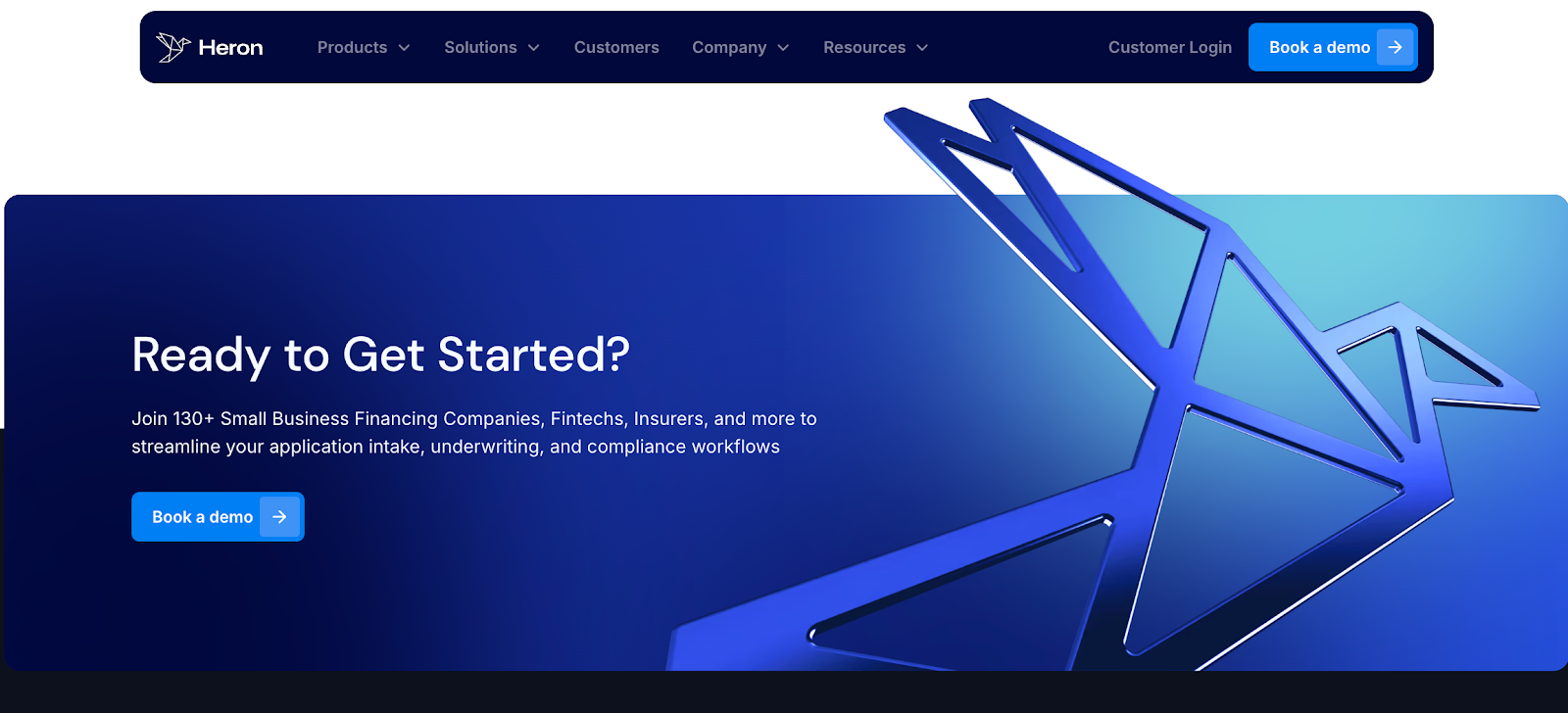
Heron is built for high-volume funders and insurance brokers who want to grow without hiring more staff.
With workflow automation, Heron handles the paperwork that slows down deal flow, including application intake, bank statement analysis, and funder decision emails.
Clean, structured data flows directly into your CRM so your team can focus on underwriting and closing more deals.
Heron integrates with 100+ platforms, including Salesforce, Dynamics, and Zoho, so you don’t need costly rebuilds or new tools. Your operators can keep working in the systems they already know, while Heron keeps the data clean, organized, and flowing.
That means less time spent on manual entry, faster approvals, and stronger client relationships managed through your CRM.
FAQs About the Best CRM for Financial Services
What is the best CRM for financial institutions?
For many banks and credit unions, the best CRM is one built as financial software that supports strong customer data management and compliance. It must let the institution see every client interaction, link to account info, and enforce privacy rules as part of a comprehensive suite of tools.
Popular options include Zoho CRM for Finance, Salesforce Financial Services Cloud, and HubSpot for Financial Services.
Which CRM is used by banks?
Big banks often use Salesforce Financial Services Cloud or Microsoft Dynamics 365, as these CRMs are built for a financial services company needing robust security and workflow tools. They also support advanced sales pipeline management across products.
Do financial advisors use HubSpot?
Yes, many do, because financial advisors rely on HubSpot’s ease of use, automation, and integrations that help deliver personalized financial advice to clients. It’s especially common among smaller advisory boutiques.
What are the 4 types of CRM systems?
The four types of CRM systems are operational, analytical, collaborative, and strategic. Analytical systems are especially helpful for spotting market trends, while others focus on daily tasks, sharing data across teams, or building long-term client relationships.


